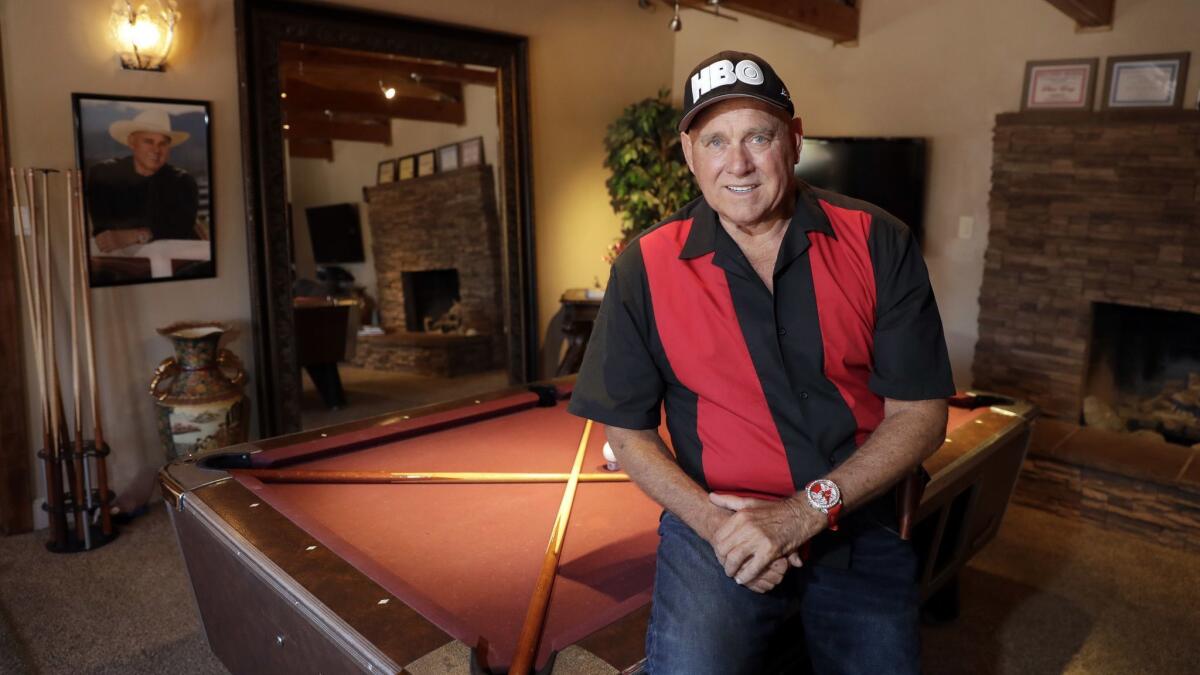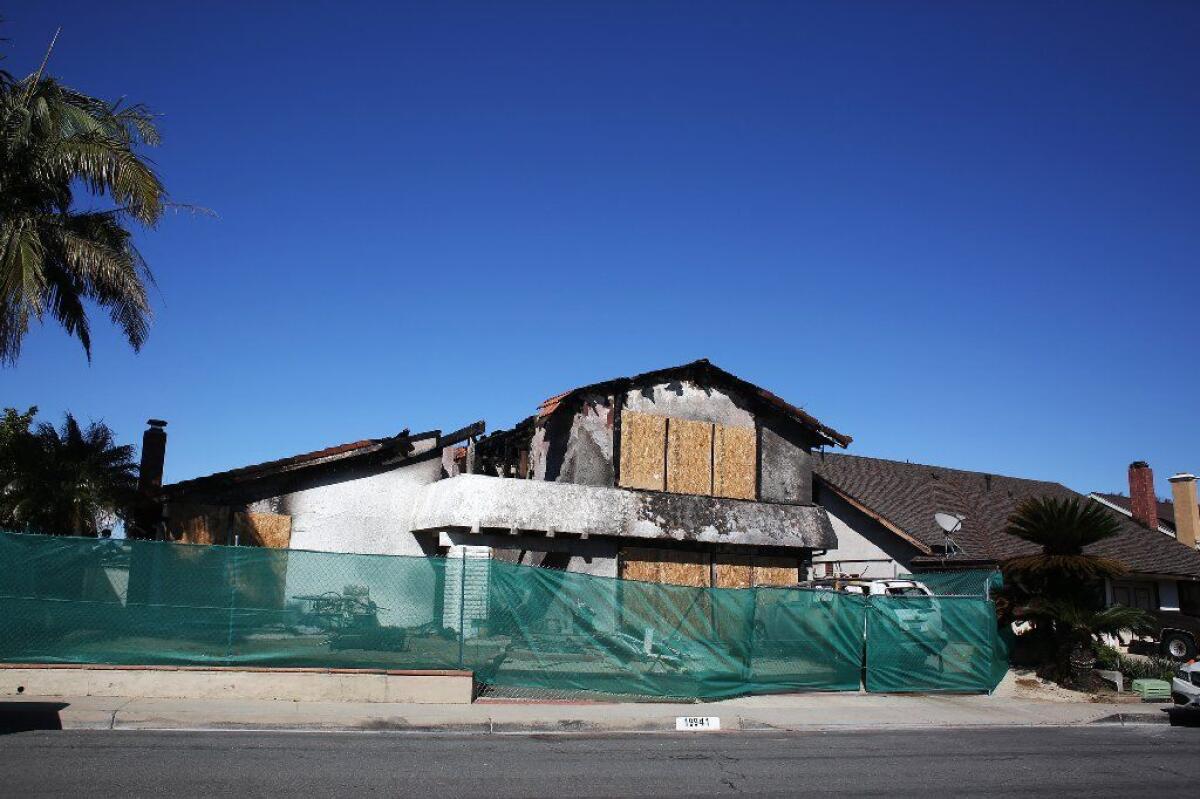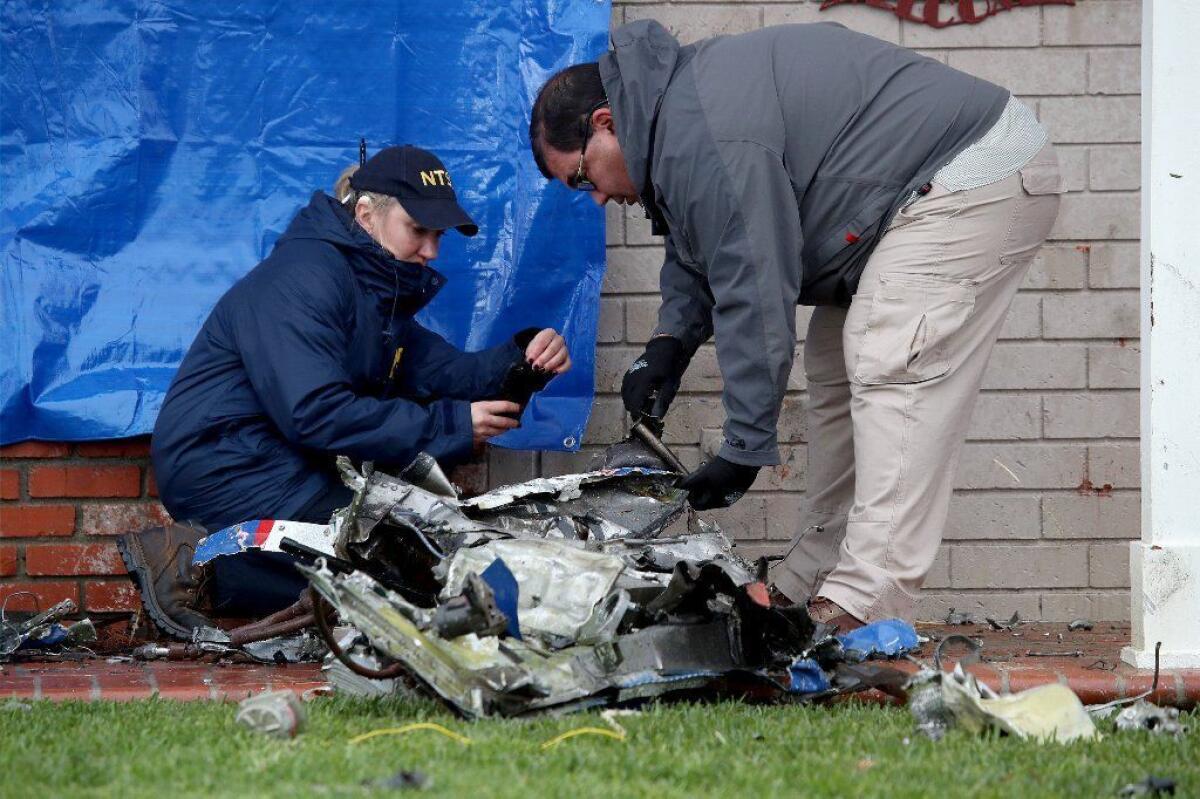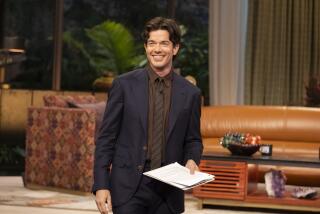Must Reads: Pilot lived a mysterious double life. Then a plane crash exposed aliases, falsehoods and questions

L.A. Times Todays airs Monday through Friday at 7 p.m. and 10 p.m. on Spectrum News 1.
Reporting from Reno, Nevada — Jordan Aaron was the president of a Carson City sushi restaurant who once ran for justice of the peace in Arizona. Antonio Pastini was the brash ex-Chicago cop who befriended a brothel mogul and spun yarns of a bare-knuckled youth in the Windy City that read like a cross between “Goodfellas” and “The Outsiders.”
They were one and the same person.
He used two names and two Social Security numbers. He kept different driver’s licenses and bank accounts under the two names, an ex-wife alleged. The ex-wife — one of four — said in court filings that he kept multiple identities to hide money, and she hinted that he had “trouble with the law.”

The pilot in a fatal plane crash on Super Bowl Sunday lived a mysterious double life.
But he might have lived out his days simply as Tony Pastini, the garrulous retired cop, had his twin-engine Cessna not plummeted 7,800 feet on Feb. 3 into an Orange County suburb, killing him and four people who were on the ground.
From the smoldering wreckage, investigators plucked a police badge belonging to Retired Chicago Patrolman #15599. That discovery would help unravel the threads of a life story Pastini spent three decades crafting. The 75-year-old, it turned out, had never been a Chicago cop, though it appeared he wished he had been.
Burning metal rained from the sky, bringing death and questions in Yorba Linda »
“Tony … loved cops,” said Jeff Partyka, a retired Reno police sergeant who frequented a deli Pastini ran in the 1990s. “They didn’t just gravitate to his restaurant because of the cop thing. He was always friendly and respectful, and he actually did have pretty decent food.”
It could take 18 months — or more — for federal investigators to probe the cause of the fatal crash. They will likely scrutinize the pilot’s medical condition and examine the three-day period preceding the crash, looking for fatigue and other “high-stress events,” said Peter Knudson, a National Transportation Safety Board spokesman.
Only in rare circumstances, such as when suicide is suspected, will the NTSB dig into a pilot’s backstory, said Barry Schiff, a longtime pilot and aviation safety consultant.
“There are a lot of weird people out there flying airplanes,” he said. “It doesn’t mean it has anything to do with how they fly.”
In a report, the NTSB said that, on the afternoon of Feb. 3, an air traffic controller warned Pastini on takeoff from Fullerton Municipal Airport that he was headed into bad weather.
If he ignored the warning, it was not the first time he had bucked conventions in the air.
On a January morning in 1977, Pastini was flying from Las Vegas to Long Beach when the weather turned icy. Clouds and fog made it difficult to fly by sight alone. Rather than turning back or changing his route, he falsely told air traffic control he was instrument-rated and finished the flight. A judge called his indifference to airspace rules “a potential threat to himself, his passenger and other users of the system” and suspended his license for 120 days.
Three years later, his plane was found behind on inspections, carrying an expired temporary registration and leaking fluid from a brake. He lost his license for 30 days.
4 victims identified as family members in deadly Yorba Linda plane crash »
Richard Wittry, the attorney for the Federal Aviation Administration who prosecuted Pastini for the earlier incident, said the offense showed “he had a cavalier attitude toward his responsibility as a pilot in command of his private aircraft.”
“He told air traffic a vital fact that wasn’t true,” Wittry, now 84, said in an interview. “He knows he’s not instrument-rated. That’s bad news. That’s an accident bound to happen.”
For years, Pastini’s restaurants were favored by cops. He enjoyed being known as one of them, both for the camaraderie it inspired with Nevada police and the boost it delivered to his businesses, said Marc Picker, his former attorney.
He gave discounts to police officers who brought their families to eat. He held fundraisers for cops who’d been mailed letter bombs, shot by stickup men and killed in training accidents. A wall of his Reno deli was covered in police patches.
After he died and federal investigators identified him as a former Chicago cop, the Chicago Police Department, the police union and an association of retired officers declared that no one named Antonio Pastini was ever a city police officer. That applied to two other names Pastini also had used, they said. The badge he was carrying when he died had been reported missing in 1978.
It was just him and the sky, man.
— Gary Willis, nephew of Antonio Pastini
Pastini’s nephew, Gary Willis, insisted that his uncle “truly was a police officer” and that he had had “perfectly legitimate reasons” to change his name. He would not say what those reasons were, beyond suggesting his uncle wanted to start life anew after leaving police work.
“When law enforcement officers leave that lifestyle, they want to leave it behind,” he said. “They’re done with that life. That may be the reason for the change of names.”
But when Pastini opened a string of delis in Nevada in the early 1990s, he openly touted a law enforcement background. He told the Reno Gazette-Journal he had retired in 1986 at the rank of “detective sergeant” after a 17-year career with the Chicago police.
The greatest guy, love this guy. A Chicago cop.
— Dennis Hof, brothel owner, politician and Pastini’s close friend

He regaled reporters with a life story of straddling “both sides of the law, as a criminal and as a cop,” as the Reno paper wrote in 1997. He recalled a boyhood of battling the neighborhood Germans and running with “a greased little group of thugs.”
He told reporters he was a Marine who had been stationed in Japan — a claim the Marines dispute.
As a businessman, Pastini sued a columnist for saying the beef hot dogs he sold were made of pork. He wrote fuming letters to newspapers that dared to publish failed health inspections of his delis.
“He was a talker — told it like it was,” Partyka said. “He didn’t give a rat’s ass what people thought of him.”
In the early 1990s, Pastini met Dennis Hof, a businessman who owned legal brothels in Nevada. This was years before Hof found celebrity on an HBO show about his bordellos and before his campaign for a state Assembly seat, which he won last year posthumously. On occasion, Pastini flew women who worked at the Moonlite Bunny Ranch, Hof’s brothel near Carson City, as well as the Bunny Ranch’s maintenance man, said Zack Hames, Hof’s executive assistant.
In a video from Hof’s 72nd birthday in October, he called Pastini “my pilot.”
“The greatest guy, love this guy,” Hof said. “A Chicago cop.”
Antonio Peter Pastini was born Jordan Albert Isaacson in the mid-1940s. Born in Illinois, he was drawn to California in his early 20s by “the itch for exploration,” said Willis, his nephew.
At 22, he suffered a motorcycle accident so bizarre it was reported by the Signal newspaper in Santa Clarita. He staggered onto the porch of an elderly woman, clutching his chest and “gushing” blood.

“He spurted out a tale that he had been riding his motorcycle with friends when someone threw a beer can at him,” the newspaper reported.
By the 1970s, he was running gas stations, tow trucks and a stereo company. He was also piloting small planes. Richard Yorty, his partner in the stereo company, recalled taking weekday jaunts to Las Vegas.
“We used to take off about noon, fly out to Vegas and come back round 5 or 6,” said Yorty, now 64.
Civil petitions for name changes that Pastini filed in Arizona and California courts offer little explanation for why he changed names. When he legally became Jordan “Ike” Aaron in 1981, he told an Arizona court that he already went by the name in California. The following year, he ran for justice of the peace in Bullhead City using that name, the Arizona Republic reported at the time. When he changed it to Antonio Peter Pastini in 2008, he wrote in a petition that he was already using the name professionally.
During a 2001 divorce, Pastini’s fourth wife alleged that he had driver’s licenses and bank accounts under multiple names.
In a court filing, his ex-wife included a W-2 form from Pastini’s sushi restaurant that showed both Jordan Aaron and Antonio Pastini drawing a wage in 2000 with different Social Security numbers. Jordan Aaron was listed in incorporation records as president, Antonio Pastini as CEO.
Pastini could not get a liquor license in his name because he “had some trouble with the law,” the ex-wife’s attorney said in another filing. A criminal assessment, done when he changed his name in 2008, showed he was arrested but not charged in 1989 for “cheating” in Nevada.
The Times requested records of enforcement actions taken against Antonio Pastini, Jordan Aaron and Jordan Isaacson from the Nevada Gaming Control Board, which regulates gambling in the state. The board said it had records for the three names but that they were confidential under Nevada law.

The only person who knows the whole story, it seems, climbed into his Cessna 414A at Fullerton Municipal Airport the afternoon of Feb. 3, bound for Minden-Tahoe Airport in Nevada. Five minutes later, Pastini’s plane burst through the clouds over Yorba Linda, barreling nose-first toward the ground, according to witnesses. Its tail and left wing were shorn off as the pilot tried to pull the plane out of the dive.
A wing that held a fuel tank struck a home where six people had gathered to watch the Super Bowl. Two escaped with serious burns. The other four were killed: Roy Lee Anderson and Dahlia Marlies Leber Anderson, a couple who brought an elderly neighbor his paper every morning and helped with upkeep; and Stacie Norene Leber and Donald Paul Elliott, relatives of the Andersons who were visiting that Sunday afternoon.
Willis, Pastini’s nephew, said the crash was “simply a tragic accident.”
His uncle, he said, loved taking flight “like a biker loves the freedom of the road. It was just him and the sky, man.”
More to Read
Sign up for Essential California
The most important California stories and recommendations in your inbox every morning.
You may occasionally receive promotional content from the Los Angeles Times.










